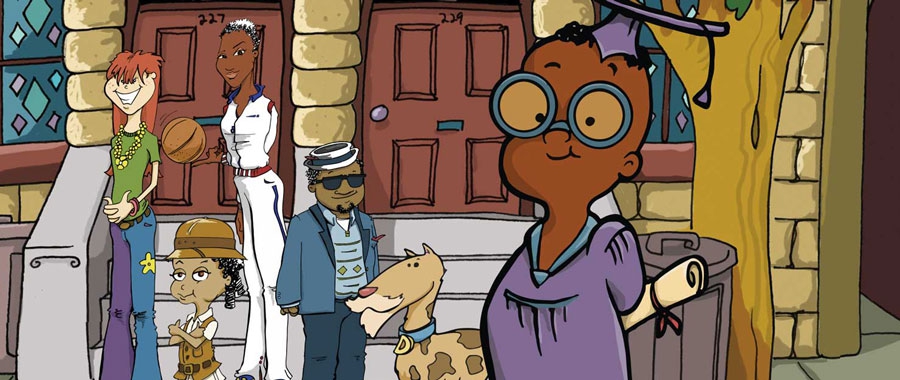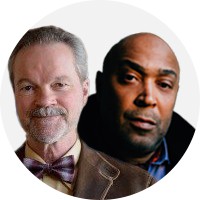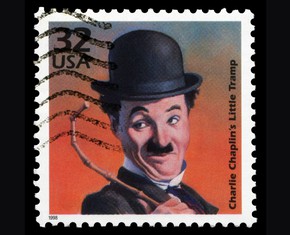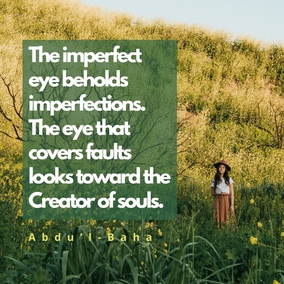The views expressed in our content reflect individual perspectives and do not represent the authoritative views of the Baha'i Faith.
In this iteration of The Universal Emancipation Proclamation series, we meet and interview African American filmmaker Joseph Lewis III, the creator of feature-length animated film, The Adventures of Teddy P. Brains: Journey into the Rainforest,which is the pilot for a proposed a TV series about race and intelligence (in search of a producer).
Q: Joe, we’re now sitting in Starbucks here in Pittsburgh, and it’s an honor and pleasure to make your acquaintance. You’re a film producer and, among your other socially significant projects – notably your documentaries on jazz great Dizzy Gillespie, a well-known member of the Baha’i Faith, and on the history of the NAACP – you’ve executive-produced the new animated film that inspired this interview.
Readers, I invite you to take a coffee break and watch this trailer of the pilot video: “The Adventures of Teddy P. Brains” below.
Can you summarize the project for us, Joe?
A: The Adventures of Teddy P. Brains is a 3D animated feature length movie that stars a 6-year-old boy named Teddy P. Brains, who gets a magical diploma from his parents for successfully graduating kindergarten. With a wave of that diploma, a spaceship enables him, his cousin Tempest and his dog D’Artagnan to travel in time and through space. In the film the kids use their minds in imaginative and creative ways to solve fun and exciting missions in the Amazon Rain Forest.
Q: Teddy P. Brains’ “magic diploma” is like a “magic carpet,” right?
A: His magic diploma acts more like a magic lamp – but unlike the three wishes that a genie grants someone who finds a mystical lamp, Teddy has to use a relevant rhyme to make the diploma have mystical power.
Q: What inspired you to create “The Adventures of Teddy P. Brains” — and what’s its mission and purpose?
A: At the time (2001) that myself and my collaborator Eugene Haynes came up with the concept, we felt that there were not enough stories that depicted intelligent, curious black or African people. Furthermore, we felt there were not enough stories that told kids that being smart is cool.
To pursue knowledge for knowledge’s sake is powerful, is fun, is life’s true magic to behold. The mission of the film is to get all kids excited about learning. It’s also about tearing down stereotypes and creating new models of perception and imagery. The overarching purpose is to share, and make the world a better place. In fact, that is the charge of Teddy’s secret organization – The Pedagogical Order of Boundless Exploration – their job is to make the world a better place.
Q: Why does your social vision and mission for this “Teddy P. Brains” project matter? Is this in response to a perceived social need?
A: I think it matters because we need a world that embraces truth, knowledge, science, curiosity, humor, and mission – those things will save our planet.
As a social vehicle, more African American kids need to see kids that look like them pursuing intellectual goals and delighting in being intelligent. There is still a deep imprint on black folks in America that says being smart is the white man’s domain. We also need white and Asian kids seeing smart black and brown kids, so they don’t believe all we can do is sing, rap, dance and play sports. If those are the only perceived roles in society that we can play, it makes it hard for a person of color to get a job as an architect or be seen as a potential captain of industry.
Q: You and I have talked about the Baha’i philosopher and educator, Alain Locke. Your cartoon character, Teddy P. Brains – and his fictional mom and dad – reminds me of Alain Locke and his parents. Do you see some parallels as well?
A: Yes, I do. As I said, Teddy is in the Pedagogical Order of Boundless Exploration. He is a part of this group because it was started by his great grandparents, who were for racial uplift just as Alain Locke was. Simply put, Alain was a race man, and so is Teddy.
Q: Abdu’l-Baha, in his 1912 Howard University speech, had a message for African Americans — and a special message for whites:
I hope that you attain to such a high degree—and this is impossible except through love. You must try to create love between yourselves; and this love does not come about unless you are grateful to the whites, and the whites are loving toward you, and endeavor to promote your advancement and enhance your honor. This will be the cause of love. Differences between black and white will be completely obliterated; indeed, ethnic and national differences will all disappear.
I am very happy to see you and thank God that this meeting is composed of people of both races and that both are gathered in perfect love and harmony. I hope this becomes the example of universal harmony and love until no title remains except that of humanity. Such a title demonstrates the perfection of the human world and is the cause of eternal glory and human happiness. I pray that you be with one another in utmost harmony and love and strive to enable each other to live in comfort. – Abdu’l-Baha, The Promulgation of Universal Peace
Here, by “grateful to the whites,” Abdu’l-Baha referred to those who sacrificed their blood and treasure and even their very lives for the emancipation of African Americans from slavery during America’s bloody Civil War. Abdu’l-Baha’s message to whites was that “the whites” should be loving toward African Americans and “endeavor to promote your advancement and enhance your honor.”
As a Baha’i, this tells me that I have a duty to do whatever I can to promote racial advancement — by loving, by promoting that advancement among everyone, and by enhancing the honor of people of color. Extraordinary message, right?
A: I wouldn’t call it extraordinary, I think it just makes perfect sense. I also think Abdu’l-Baha probably thought there was a karmic aspect to his statement as well. Besides profit, hate was fundamental to maintaining the institution of American slavery for over 240 years … I think he knew we need to balance the scales of the universe with 240 years of love, honor and compassion.
Q: Is racial advancement – here, through education in your ““Teddy P. Brains” project – ideally an interracial concern and social endeavor? If so, why? We’re all in this proverbial boat together, right?
A: Absolutely. I think the more truthful information, knowledge and understanding people obtain makes it better for all of us. We have to work together to make the world a better place. If not, the flames of hate, distrust and social inequity will continue to burn.
It’s funny, we now live in a world where we are bombarded with information for profit, disinformation, and polarizing information for political gain and religious strife. The media that provides us news isn’t fake, but it clearly needs to be more robust when it comes to reporting the truth, now more than ever, because the planet is at risk, our society is teetering, and the stakes have become too high.
Q: Thanks, Joe. All the best in your re-launch of “The Adventures of Teddy P. Brains.” I hope this series can succeed in getting syndicated!
A: Thank you, Chris!
















Comments
Sign in or create an account
Continue with Googleor